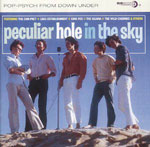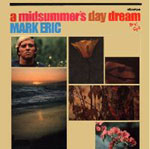What is it with re-issues? | |

| What is it with re-issues and compilations of stuff that was made when I was too young to notice? Why do I want to listen to music that was made before I was born or before I had the heart and soul to hear? And why do I more often than not choose to listen to such sounds instead of seeking out contemporary music-makers? Of course I don't know. I don't know that I care either, it's just that there's this nagging little doubt tapping away on my shoulder, saying 'you're turning into a boring old man'. I'm still fighting the fear that says liking things which are old means you are old yourself; that giving into that fact means a loss of passion or something daft like that. Which is mediated bollocks of course, it's just... It's just, why am I finding more excitement in the sounds of a forgotten '60s band from Australia called 1863 Establishment than I am in the Kills? Does this make me boring or does this simply mean I am less susceptible to hype than some? Does it just mean I have taste? Or does it mean nothing at all? Whatever. If truth be told, mostly I only listen to 'new' music if it is sent to me for review. Maybe it's because of this that I've grown lazy about investigating contemporary sounds. And maybe it's because my cash flow has been freed up as result of these 'promotional' records that I can spend it instead on reissues and compilations of obscure forgotten records from way before my past. Again, whatever. Most played of my most recent acquisitions would be the Pet Projects collection on Ace. Ace is an aptly named label of course and Pet Projects is acer than almost anything else around right now. A collection of Brian Wilson productions mostly dating from 1962 through '69 (with the American Spring recording 'Shyin' Away' sneaking on from 1973), Pet Projects naturally shows off some of the finest slices of marvellously na¥ve sunshine Pop you're likely to hear anywhere. Of course there's plenty of The Honey's here (8 tracks, 9 if you include the off-shoot American Spring), and my own favourite here is the wonderful 'Pray For Surf' a-side that is stuffed full of such obvious West Coast clichés that you can almost feel the sun on your shoulders and the spray in your face. Elsewhere there are four cuts by Sharon Marie, a one-time Mike Love paramour who cut just these two singles before disappearing into obscurity away from the record industry. Her four cuts are fine slices of early '60s girl-Pop, notable mainly for 'Thinkin' 'Bout You Baby' which would resurface with different lyrics four years after its release as the Beach Boys' own hit single 'Darlin''. Also included here are both sides of Gary Usher's solo single, Usher of course being one of the production king-pins of the whole '60s West Coast pop scene and an intrinsic part of the Beach Boys' story. His production skills may have become legendary, but his singing rightly has not, and both 'Sacramento' and 'That's The Way I Feel' are really only of tangential interest. The highlight of the collection meanwhile is surely Glen Campbells's awesome 'I Guess I'm Dumb'. Coming off the back of replacing Brian in the Beach Boys' live line up, Campbell recorded this single in 1965, at which point it was almost universally ignored. As a result it's grown into mythic, legendary status, and rightly so. With the Honeys backing him up, Campbell here reaches vocally higher, wider, further than he ever would again. 'Guess I'm Dumb' is a heady peak in a collection of fine highs. |

|
John Carney recently mentioned the Makin' Time set on Ace off-shoot Big Beat, and the same label has entertained me immensely recently with the Peculiar Hole In The Sky set by obscure '60s Australian bands. Nearly all of the cuts here are from that 1967 - '69 era when psychedilia was ruler of the roost, but thankfully most of these artists are more in tune with the kinds of melodic beat-psych made by the likes of the Creation, The Action or naturally the mild-psych-symphonies of the Bee Gees than the rock over-doses served up by Cream or the Jefferson Airplane. These are largely groups still touched by the Beat Boom, still hanging onto their suits and only vaguely touched by the tie-dyed revolutions happening half way around the globe. There are really too many highlights in the 27 tracks to mention, but I cannot resist picking out two: first up Melbourne's aforementioned 1863 Establishment, who delight me with both sides of their sole 1968 release, in particular the delicious 'Picture Of A Girl', a song that wouldn't sound out of place on the Bee Gees' Idea. Then there's fellow Melbourne band The Cam-Pact, who with the amazingly dynamic 'Drawing Room' turn in a monumental slab of Power Pop that lights up the stratosphere with guitars that could fathers those that play similar tricks on 'Made of Stone'. Magical. It's great to see the Rev-Ola label back in business, now under the wing of Cherry Red as opposed to Creation, but still the baby of the legendary Joe Foster. Foster's obsession with obscure '60s Pop has been well documented over the years, and in the previous incarnation of Rev-Ola he's helped many discover the delights of such luminaries as the Millennium/Sagittarius coalitions amongst others. It's the Millennium who serve up the first of my recent Rev-Ola purchases, with the Voices of The Millennium collection. Really it's a collection of demos for songs that would later appear on the second Sagittarius album The Blue Marble, although with the edges between both those illusory and mythical groups being so blurred, it's a moot point which band name appears on the cover. If you're new to the whole Sagittarius / Millennium game, this isn't the best starting point (you'd be better off tracking down the Poptones Again release as a way in) but it is nonetheless an intriguing part of the puzzle, and is an essential album to file next to the reissues of the two Sagittarius albums and the amazing Sundazed triple CD Millennium/Ballroom set. |

|
Also on Rev-Ola is a release that collects together the Without Earth and The Moon sets by California's The Moon. Formed in 1967, The Moon are maybe most well knows for featuring ex-Beach Boy David Marks, but singer/songwriter Matthew Moore and producer/drummer Larry Brown were no doubt equally valuable parts of the puzzle. Most of Moore's songs on both these albums from '67 and '69 respectively are superb, treading the lines that reflect influences from the likes of Buffy Sainte-Marie and Dylan merging with the emergent predilection for psyche-pop. So the songs then on both albums float in seas of strings and bubbles of purple and orange, backwards guitars and sitars drifting in on the Big Sur breeze. It's pretty obvious stuff in places, but none the worse for that. Similarly obvious are the Blades of Grass, another forgotten bunch of '67 hipsters whose Blades of Grass Are Not For Smoking collection, also on Rev-Ola, is a treat of Turtles-esque Pop. Notable is the kick-off single 'Happy', a hit for the band on the East Coast whilst out west the Sunshine Company were charting with their own version. It's as fine a slice of mid '60s soft-pop as you'll find anywhere. Elsewhere a cover of the Left Banke's classic 'Walk Away Renee' cements their soft-pop credentials, whilst a cover of the Beatles' 'Help!' of course leaves me cold. But hey, who wasn't covering the Beatles in 1967, right? |

| Still with rev-Ola, there's the great Songs of Protest and Anti-Protest by Chris Lucey. Of course Chris Lucey was just a pseudonym and the tracks collected here are actually by legendary LA anti-hero Bobby Jameson. Jameson featured on the famed 1965 Mondo Hollywood documentary (alongside other luminaries such as Sinatra, Reagan, Frank Zappa, Jay Sebring and, coincidentally, future Manson Family member Bobby Beausoleil) and recorded his first couple of singles in '64. Those singles aren't included here, but you do get Bobby's terrific '66 album which is full of spacey psyche-folk that often recalls the Lovin' Spoonful and that make the hairs on your neck stand on end. You also get Steve Stanley's informed and entertaining sleeve-notes, from which it emerges that the cover star of the Jameson / Lucey album was in fact none other that Brian Jones. Oh what a mixed-up magic time it was. Or is made to seem. Last of my Rev-Ola purchases is the Mark Eric A Midsummer Night's Dream set, a collection I'd been after since I read Bob Stanley's review in a copy of Mojo some time ago. Released in 1969 when Mark was all of nineteen, this must have sounded oddly out of sorts with its time, trapped instead in a previous era of Four Freshmen / Beach Boys harmonies and defiant softness. There are some glorious moments here, all of them Mark Eric originals. Opener 'California Home' sounds how you would hope it might; all bright sunlit chords, yellow zinnias reflecting off the sky; 'Move With The Dawn' is an orchestrated leap on the jet stream, whilst 'Where Do The Girls of Summer Go' is simply a monumentally aching beauty of a glance at the melancholic delights of Autumn that you'd be hard pushed to surpass. A Midsummer Night's Dream is a real treat, and hats off to Rev-Ola for bringing it into the light. © 2003 Alistair Fitchett |